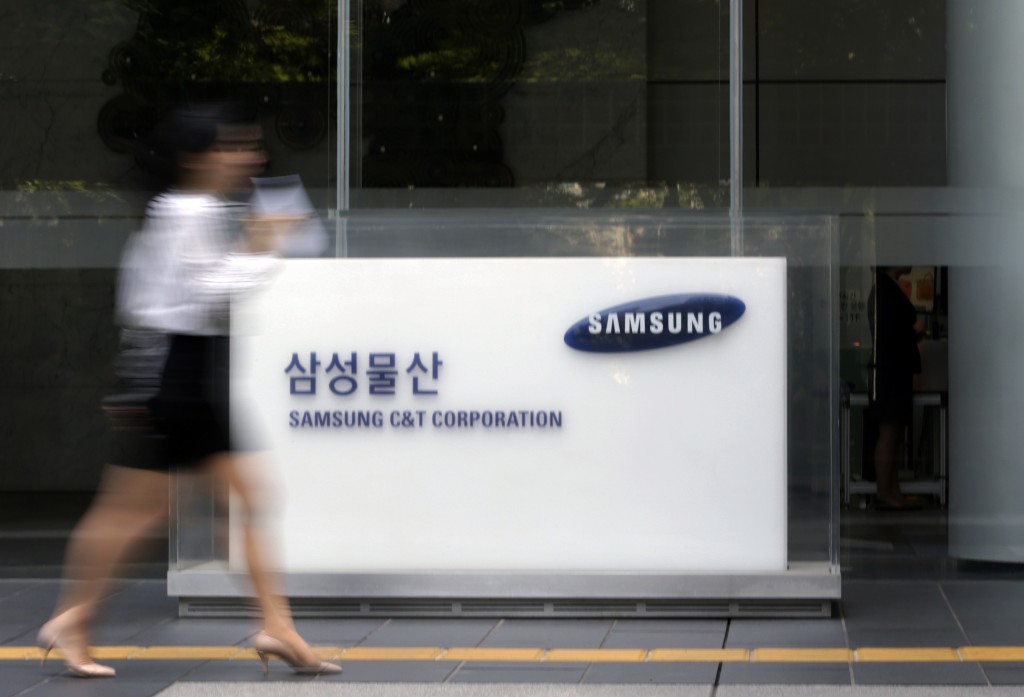Foreign fund’s fight with Samsung galvanizes shareholders

In this photo taken on May 26, 2015, an office worker walks by a logo of Samsung C&T Corp. at its head office in Seoul, South Korea. Thousands of South Korean investors are backing an American hedge fund’s bid to thwart a business combination between Samsung companies that they argue will only enrich the conglomerate’s wealthy founding family. AP
SEOUL, South Korea — Thousands of South Korean investors are backing an American hedge fund’s bid to thwart a business combination between Samsung companies that they argue will only enrich the country’s richest family.
At stake: Billions of dollars for the Lee family that founded Samsung and South Korea’s image as a fair place for investors, big and small.
Last month, Samsung announced that its defacto holding company Cheil Industries, which operates fashion, catering and theme park businesses, will take over Samsung C&T, a builder of skyscrapers and trader of goods.
But the takeover ratio, which gives a mere 0.35 share in the new entity for each C&T share, prompted Elliott Associates, the American hedge fund that is the third-largest investor, to take legal action against the deal. The fund says the takeover is unfair to C&T shareholders because it undervalues the company.
Despite the poor image of foreign hedge funds in South Korea, many investors here agree with Elliott.
Article continues after this advertisementThe takeover “is far from being fair or reasonable,” said Kim Gyeong-hwan, a 40-year-old dentist in Seoul who owns about 40 million won ($36,000) of shares in Samsung C&T. “Elliott’s argument is reasonable. Shareholders are owners of the company, not the head of the company.”
Article continues after this advertisementFew buy Samsung’s argument that its plan for one company in the empire to take over another will create business benefits. The deal is instead seen as crucial for the once-in-a-generation leadership transition underway at Samsung, which has accelerated since patriarch Lee Kun-hee, 73, was hospitalized after suffering a heart attack in May last year.
His son and heir apparent Lee Jae-yong does not have a major shareholding in Samsung Electronics Co., the crown jewel in the Samsung empire. Inheriting his father’s shares in Samsung Electronics or his stakes in other key Samsung firms that have stakes in the consumer electronics giant would incur heavy inheritance taxes that could go over $5 billion.
But Lee, 47, is a major shareholder in Cheil thanks to shares he was effectively gifted before the company went public. If Cheil takes over Samsung C&T, Lee will control its 4.1 percent stake in Samsung Electronics that would cost him $7 billion if he had to buy the shares on the market.
The groundswell of shareholder activism in support of Elliott Associates is a departure from South Korea’s typical hostility to foreign funds and shows that weak corporate governance, often cited overseas as a risk of investing in Samsung and other family-controlled conglomerates, is getting growing attention in South Korea. Most of the country’s biggest companies are publicly traded but the families who founded them one or two generations ago retain disproportionate influence, irking other shareholders who feel the business elite treats public companies as their personal property.
Samsung says the proposed takeover deal and ratio are legal. It says the ratio is based on Samsung C&T’s recent share price. It was near a five-year low before the deal was announced, a performance at odd with its robust finances.
Kim, the dentist, is leading efforts to ensure that Samsung C&T management, its board and other shareholders hear their voices, including South Korea’s National Pension Service, which has a 9.9-percent stake in C&T and has not expressed its stance on the deal. More than 2,000 shareholders in C&T have gathered at an online community, vowing to vote against the deal, while others supporting Elliott have written to the court that will hear the case.
Elliott’s maneuvering has tapped into discontent in South Korea with how regulators, the media, and the country’s pension service, are not standing up for shareholders.
Kim Jae-chul, a 63-year-old retiree from the textile industry, said he was so angered he bought 680 shares so he could vote on the deal at the July 17 meeting of C&T shareholders. Even though he feels proud when he sees Samsung phones abroad, that pride isn’t going to stop him from casting his first vote as a shareholder against the deal, he said.
“I feel enraged to think how Samsung neglects the weak people and brings all profit to the founding family.”
Some who oppose the takeover acknowledge they probably won’t succeed in derailing it. Shareholders who have verified their shares on the online community account for about 0.2 percent of C&T’s outstanding shares. They hope to amass over 3 percent of the vote.
“Regardless of the opposition from the public, succession steps will continue,” said Oh Sang-pyo, who holds voting rights for 1,500 Samsung C&T shares. “But in organizing the succession, there should at least be a sense of ethics, transparency and compliance with law. Taxes should be properly paid.”
An expert in corporate governance said Elliott’s legal battle and support from the minority shareholders in Korea will send a message to Lee, the Samsung heir, that the current way of making decisions could come at a cost.
“Everyone knows that the merger was announced for succession and inheritance, not for the company’s value or for shareholders’ profit,” said Chae Yi-bae, an analyst at the Center for Good Corporate Governance. “Now vice chairman Lee Jae-yong has lost trust from markets and from shareholders.”